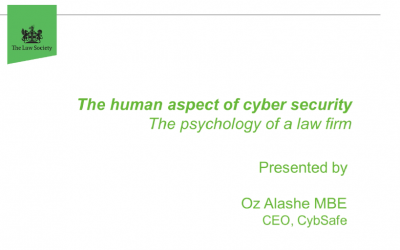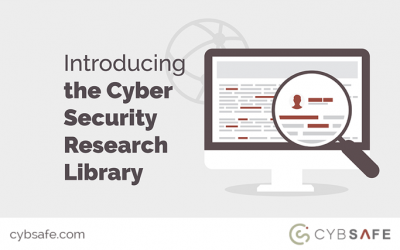Rewind
All the content from last year’s PeepSec, Impact and flagship industry events
What form should GDPR training take?
People Management
Financial Conduct Authority Partners With CybSafe to Tackle Human Aspect of Cyber Security as part of 2018/19 Business Plan
CybSafe, Level 39, London, 17 April 2018: CybSafe, the providers of a GCHQ-accredited cyber security awareness platform, announced that it has been selected by the Financial Conduct Authority (FCA) to help shape guidance on tackling the human aspect of cyber security...
FCA partners with CybSafe to tackle cyber security
FS Tech
CybSafe secures one-year contract with FCA to tackle human element of cybersecurity
Finextra
Financial Conduct Authority Partners WithCybSafe to Tackle Human Aspect of Cyber Security as part of 2018/19 Business Plan
Global Banking & Finance Review
Creative engagement methods: Engagement process
Creative security engagements can take many forms and can be configured in different ways but they follow a similar pattern of actions: Frame, Identity, Process, Narrate. The process is not a linear, step-by-step process but an iterative one where the Facilitator of a...
FCA Business Plan 2018/19 – cyber security in FS Sector
Global Banking and Finance
Revitalizing privacy and trust in a data-driven world
This report summarises key findings from ‘The Global State of Information Security Survey 2018’, which surveyed 9,500 global C-suite executives and directors about their organisation’s security practises. The report identifies and expands on nine data privacy and...
Security force
Flybe Flight Time
Interview: The motivation behind building a cybersecurity business
Security Brief Europe
Newsbite: Criminal behind €1 billion cyber-bank robberies arrested in Spain
SC Magazine
Cybercrime mastermind arrested in Spain
Silicon Republic
What the Internet of Things means for consumer privacy
What the Internet of Things means for consumer privacy discusses the findings of an Economist Intelligence Unit (EIU) research programme, sponsored by ForgeRock, that explores the privacy concerns and priorities of global consumers stemming from the Internet of Things...
I hacked my apps to find where my data was going and you should too
Evening Standard
Catalyst Sale Podcast 1/Feb/18 Oz Alashe and Mike Simmons
Catalyst Sale Podcast 1/Feb/18 Oz Alashe and Mike Simmons
On demand webinar: The human aspect of cyber security
The human aspect of cyber security
Creative engagement methods: Everyday security
Creative security engagement is an approach that helps participants to draw out the details of day-to-day security practices. As a result, such engagement methods are not only able to sketch out issues related to IT infrastructure and its use but also the everyday...
Creative engagement methods: An introduction
Sharing experiences about digital practices and about digital security in particular is an important means of learning and sharing security practices. These stories are also important because they bring out the difficulties and inconsistencies people face in...
Navigating the new cyber security threat landscape
This report is designed to educate and inform organisations on the cyber threat landscape. It explores what to consider when disaster strikes and explains the importance of people and partnerships. Read full paper ...
Introducing the Research Library: the world’s first archive of research into the human aspect of cyber security
Did you know as security training frequency increases, security awareness seems to decrease? Or that messages of fear can backfire if threats never actually materialize? Or how about that people who are familiar with Facebook are in fact more likely to be scammed via...
The “human factor” in cyber security reading: Exploring the accidental insider
A great deal of research has been devoted to the exploration and categorization of threats posed from malicious attacks from current employees who are disgruntled with the organisation, or are motivated by financial gain. These so-called “insider threats” pose a...

